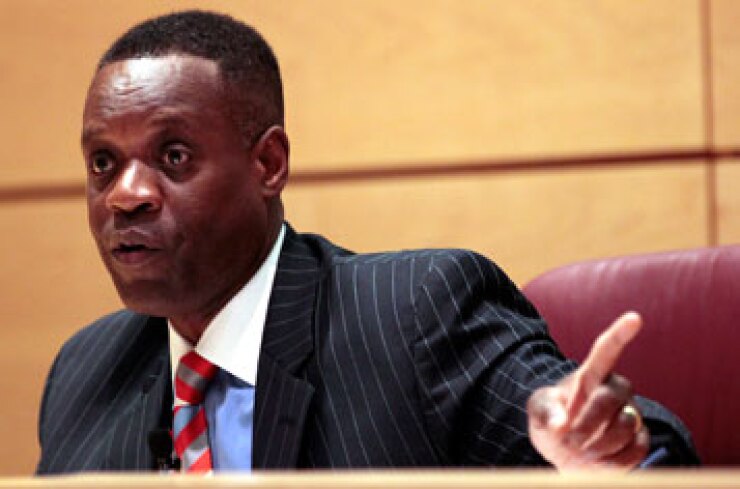
CHICAGO — Detroit's emergency manager, Kevyn Orr, Wednesday offered a glimpse into the bankrupt city's high-stakes negotiations — and subsequent settlements — with bondholders.
Orr took the stand Wednesday as the city's witness during a federal trial to decide if Detroit's bankruptcy plan of confirmation can be confirmed.
Orr said he considered a settlement with the city's limited-tax general obligation bondholders as key to the case, signaling to other financial creditors it was ready to cut deals. Orr also said limited-tax bondholders deliberately made the process "as painful as possible" as part of their strategy to boost recoveries.
Orr, one of the architects of the largest municipal bankruptcy in the US, was the one of the most anticipated witnesses in the trial. U.S. Bankruptcy Judge Steven Rhodes, who is overseeing the case, will rule on whether the plan is fair to all creditors and provides a feasible path toward stability.
Financial Guaranty Insurance Co. is the last major holdout creditor in the case. The insurer is reportedly in close to a deal with the city. Orr said Wednesday that he hopes the city will soon have a deal with the insurer.
After discussing his early controversial days as emergency manager in 2013, Orr began going through the various settlements that have won creditor support for the plan.
One of the city's earliest deals was reached with unlimited-tax GO holders, who agreed to a 74% recovery on their $388 million claim. The manager said Detroit agreed to that number — up from an original proposal of roughly 10 cents on the dollar-to avoid the possibility of losing a fight with ULTGO holders, who believed their claims were secured by a dedicated property tax levy.
"I had no reason to believe anyone would throttle back in litigation," Orr said, according to reports. Litigation would have been "pretty vigorous," he said, noting that that the issue of whether the ULTGO claims were secured were untested in a municipal bankruptcy.
Orr said the ULTGO deal demonstrated "to the financial community we were in the business of negotiating," according to the Detroit Free Press. "We were serious we would do any transaction with any claimant that made sense."
A deal with the limited-tax GO holders came months later, after the bondholders agreed to a 34% repayment with possibility for more depending on the outcome of the city's lawsuit to repudiate $1.5 billion of certificates of participation.
The city thought it would have been difficult to win confirmation for its plan of adjustment without the LTGO deal, said Orr, but negotiations were difficult.
"Part of their strategy is to make the process as painful as possible," he said.
He said the LTGO holders believed the stakes were high, because the city's proposed 10% repayment would have a national effect on such debt. The insurers and holders also believed they had liens against city property, he said. They wanted to "nip in the bud" Detroit's treatment, according to Orr.
The manager also talked about the "angry" reaction among the financial press and trade publications after Detroit's default and treatment of its GO bonds as unsecured. "Everybody was trying to use Detroit as a metaphor for municipal ills," he said.
The court-ordered mediation proved essential to nailing the settlements, said Orr, saying all but one settlement was reached during mediation. He called the mediation "crucial" to the speed of the case and the ability to win creditor support for the confirmation plan.
Orr was to continue his testimony Thursday. Mayor Mike Duggan, whose testimony is considered important to show the city's ability to implement the plan post-bankruptcy, is expected to take the stand as soon as Tuesday.





